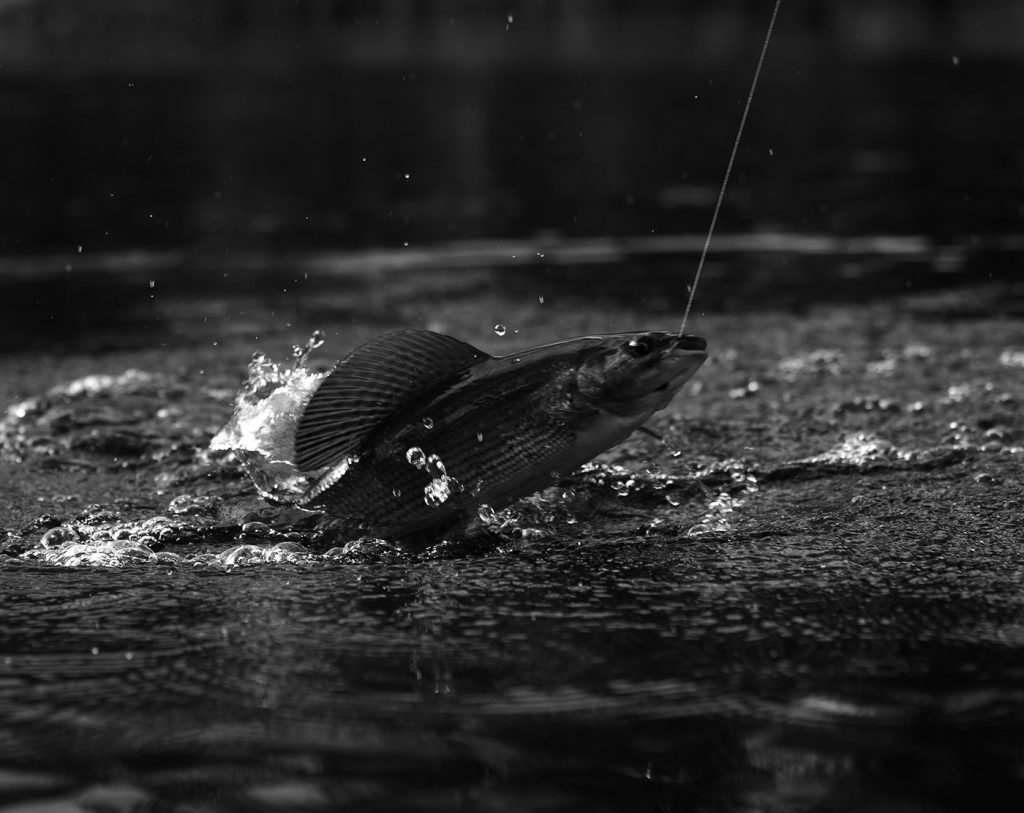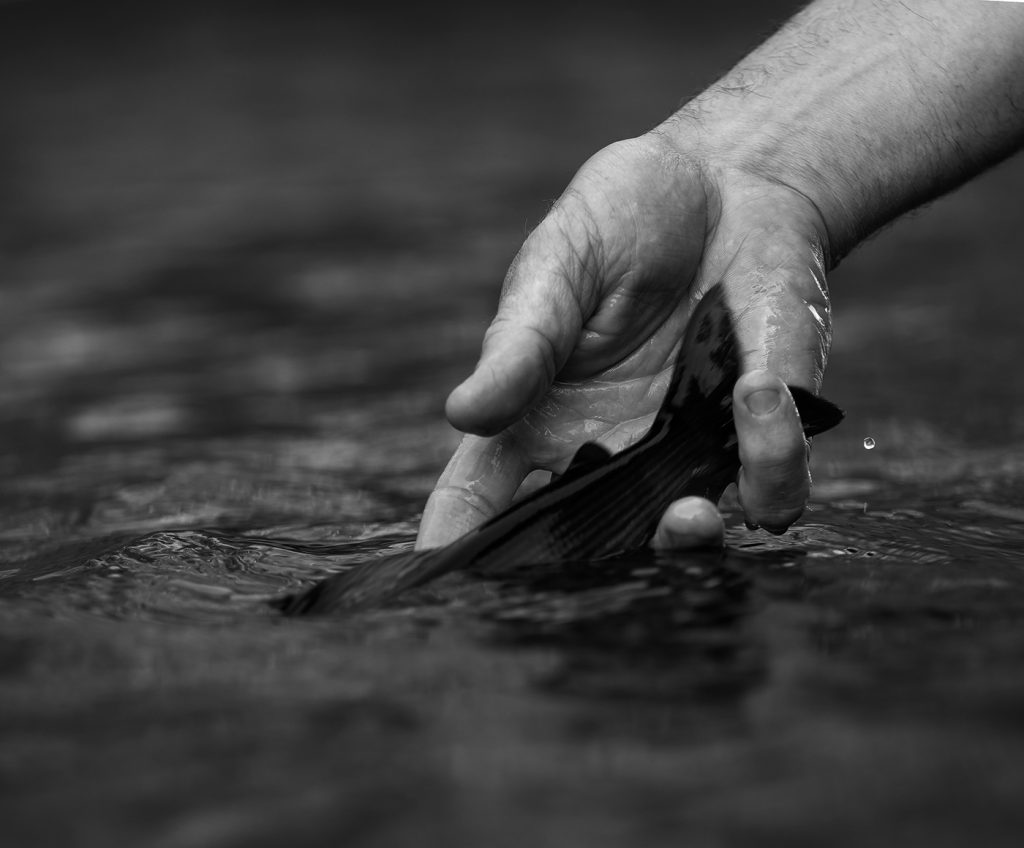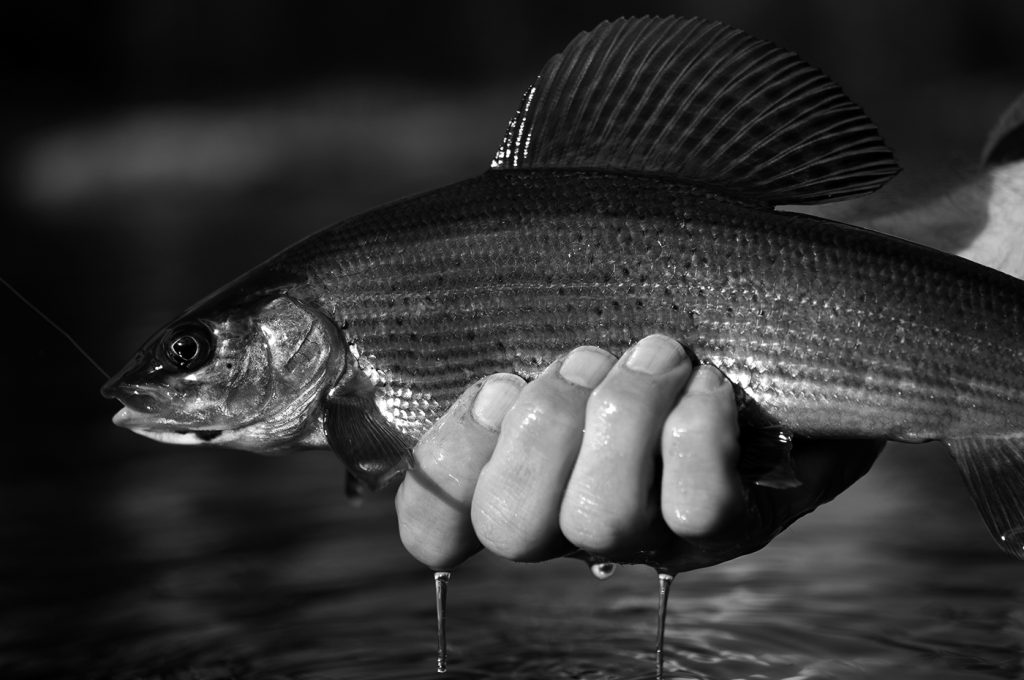
The question is not how to fish, but why you do it. The author and his fishing buddies do it out of necessity. It’s more important than life and death to them to escape the human world, step in to water and wave a stick. Left on the shore is their misery and worries. Standing in the water they find freedom, healing and occasionally a fish.
Battles are lost and won with tongue in cheek and always celebrated with mountains of cake and an endless stream of fresh espresso coffee. To the band of brothers it’s more important who you fish with than how big the fish is; except for the ones lost.
You may not learn a lot about catching more and bigger fish, but reading these stories is like holding a mirror up in front of yourself getting a little wiser. The small why is a big one.
- This artickel is written by Danish photojournalist Søren Skarby

“I’ve seen some bears there lately.” My friend, The Baker, blinked to his partner in crime, we laughed but he had planted a seed of doubt about the wisdom in camping the place we had just told him about.
My fellow countryman moved up here north of the Arctic Circle many years ago because he’s so fund of fishing and hunting. He got so well integrated that he even won some competitions in cross-country skiing. The locals looked in disbelief at a winner that comes from a basically flat and even in the coldest winter often-snowless country, he loves to tell the story.
Today he has sold the bakery to his son and only thinks of one thing, salmon. The same can be said about his local friend. Three months before the start of the season they begin packing and repacking their fishing gear at least once a week. New flies have been tied during the long dark winter, lines cleaned and reels parted oiled and assembled again. It’s one long preparation for a short intense summer with 24 hours of light every day at rivers at even more northern parallels that we were sitting having a beer.
One summer The Bakers friend drove home totally disillusioned after loosing a 34-pound salmon when the tippet broke. How could he know the size of the fish that he lost after a long and very bitter fight? The day after the lost battle a guy from a neighbouring country caught a 34-pound salmon in the same river on a stupid wobbler. Stuck in the jaw of the magnificent fish was a fly tied with all the expectations and dreams you can think of.
For a fly-fisher to the core the defeat was too much to bare since the vice where the naked hook got dressed to kill was standing inside the house we were sitting in front of. The Baker beamed when he told the story but his friend was just looking down in his beer. The memory was still a very present nightmare to him.
You have to drive to the small town to get in the right mood letting the landscape in, stopping at all the rivers leaning over the railing of the bridges looking for fish in the very often heavy current. Around 80 miles before the town you enter the municipality that only is home to around 6000 souls. There’s loads of room here. A little further up the road you pass the Arctic Circle and that spells 24 hours of light in the middle of summer and in other words 24 hours of fishing.
After visiting The Baker and his friend we drove back to our camp made dinner and while we consumed it sitting by the fire, clouds began to roll in over the lake and the wind picked up. Then all hell broke loose with an almost violent thunderstorm. While we retreated to the car plates in hands I thought about being experienced enough to put up the tent before the rain, it stood there ready to shelter us.
Up here thunderstorms can roam around in a valley for days and so it did. We spent most of our time in the car or the tent reading and once every day we drove to town. The latter was out the necessity to sometimes walk around in a shop and stretch our legs. Being outside was like standing in a very cold shower getting slapped in the face over and over again. It’s just the way the weather can be close the top of the planet. Live with it, be patient and read some thick books, it will pass.
For four days the only difference between day and night was the brightness of the grey light. After all it was in the middle of summer north of the Arctic Circle.
Then very late one evening the sky began to have what could look like a remembrance of colour and the rain stopped. We crawled out of the tent listened to the birds that began to sing and inhaled the strong scent of the soaked forest behind us. With something like a miracle nearly at the same level as virgin birth I managed to start a fire with the wet wood. Then we sat down, had a scotch and enjoyed that the wind and rain was gone.

Nature wake up as fast as it can up here since the time for bringing the next generation forward is extremely limited. As we sat there the trees were still dripping from the last drops of rain while life returned around us as if nothing had happened.
Over a small island in the middle of the lake two bohemian waxwings were catching insects in the air. I’ve never thought of it before, but now I know where those birds spent their time in summer. The insects looked big and it made something form in the back of my brain. Could it be?
On the lake that looked like a mirror tracks began to form not straight but curved and unpredictable in every direction. I moved down to the water and began to observe the reason for all the commotion and to my joy it was caddis. Not the usual size but some substantial big buzzing insects. That must be the largest caddis existing.
“It’s now,” I said to the mother of my daughter. She looked at me and had every good reason to want an explanation “Caddis” I said, “They are on the move and when they are, so are the grayling”.
The main attraction for me fishing in the rivers up here is not trout or salmon, but grayling. “The grey lady of the river” as it’s nicknamed in the motherland of modern fly-fishing.
I can’t explain exactly why that fish is so intriguing, but maybe it has something to do with the unproportional big dorsal fin where you can see a rainbow of colours or it can be the graylings willingness to rise from the bottom of the river and take a dry fly. Or is it the scent?
When the grayling was given its Latin name it wasn’t, as for so many other animals, because of its looks, but its scent. Every year at the first day of the season I see fishermen catching the first fish of the day holding it up under their nose catching the scent. It’s as if they want to make sure that a fish having an odour of thyme still exist.
We unloaded the canoe from the top of the car and into the lake. The rods where already rigged. Gliding on the water I thought about human stupidity. We were paddling on a lake, but not a natural one.
The big river is blocked with several dams and that forms lakes and small streams that all lead down to the first dam. The salmon are gone, they used to be numerous. From the dam the water is lead for miles in a tunnel deep down in the rock. Looking at the dry riverbed can bring a tear to your eye and so it often does for those who live here.
They used to go down to the river and catch salmon, but now they can’t because of energy hungry big cities far down south. Today the catastrophe is beginning to dawn for the politicians in the capital and maybe there’s still time to save the salmon.
There was a current starting to drag the canoe forward as we began to sail on the river. Together with the first boils it washed away my melancholy. I grabbed my rod and tied a big caddis fly to the end of the tippet. There was no doubt about the coarse of the day and it was served generously.
The surface was full of big winged fast moving burgers and the grayling was doing all they could to inhale them. Not an easy task for a fish with small mouth and an overbite. The grayling were doing roll over’s in the water in their effort to get a hold on the luscious bugs. Very often the caddis were only drowned for a short while and then kept on buzzing along on the surface. It looked like the water was boiling.
My daughter’s mother did a good job as ghillie steering and holding the canoe in the current while I started casting and the fly got a lot of attention from the very first drift.
Since the grayling just had learned that big caddis have to be attacked with no mercy they did exactly the same with my lousy imitation. It made them very easy to hook. Fish was caught and released again and again until I spotted a huge dorsal fin waving over the surface.
I sat and watched it for a while and at the same time promised my hard working ghillie that if I hooked up with that fish her job was done. For once I made a perfect cast and the fly only drifted for a few seconds before the owner of the dorsal fin made an underwater roll over and got hold of the fly, tight line.
Grayling are not fierce fighters and there’s normally no big leaps and long rushes, but their love for strong current and the oversized dorsal fin have made them develop a pretty smart trick. This one was a seasoned fellow and it knew the trick very well turning 90 degrees in the water making the power of the current hit the side of the body and dorsal fin.

I suddenly had the feeling that I had hooked up with a huge piece of drifting timber as my rod started bending in a precarious way. The water was deep so there was relly no reason to worry. There were loads of water to fight in and the fish gave in after a few minutes. I handled it with all the care in the world and admired its perfect fins, the colours in the huge dorsal fin and not at least the colour of its body.
Big grayling are not silvery as the small or middle-sized are, they are blue. This one had the most excellent blue glare on every scale and a gill cover that looked like the mother of pearl. I released it picked up my paddle and gave my ghillie rest all the way back to our camp.
Laying in my sleeping back I had the take, the fight and especially the look of the fish on repeat. It took a long time before I fell asleep with a big smile on my face.
The next morning while making coffee the smile evaporated like a jellyfish in a dessert. While we slept a bear had paid our camp a visit leaving its ill smelling business card a few feet from the tent.
This story and others can also be found in our podcast-section here.
